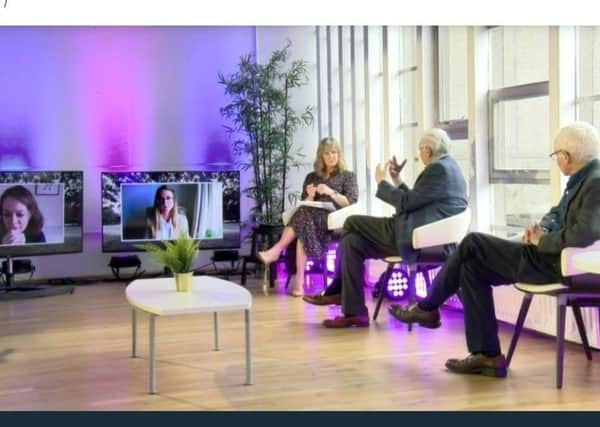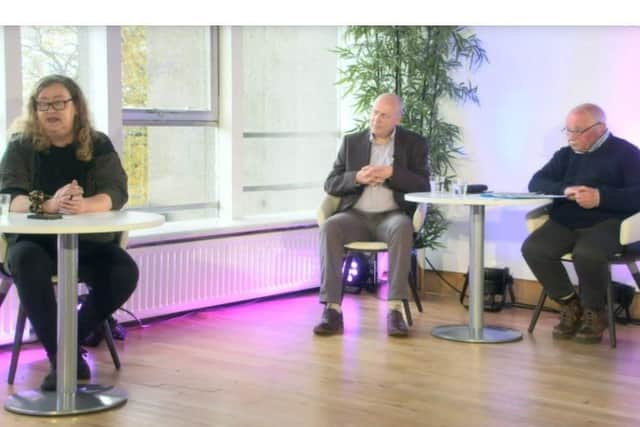NI centenary: Historians discuss varying perspectives on 100 years of Northern Ireland


The event was held at the Ulster Museum in Belfast and broadcast online live, the day after the 100th birthday of the creation of NI on May 3 2021.
The debate was sponsored by the Northern Ireland Office (NIO), with introductory remarks by the secretary of state Brandon Lewis, and chaired by Tara Mills of the BBC.
Advertisement
Hide AdAdvertisement
Hide AdEight academics from the Historical Advisory Panel spoke, a group that was formed, it says, “to consider the history of Northern Ireland in all its complexity”.


Members were appointed by the UK government as part of the Northern Ireland centenary project in order to deal with the “historic elements” surrounding its creation.
The panel comprises:
• Professor Lord Bew, Emeritus Professor, Queen’s University Belfast (the chair);
• Dr Brian Barton, Independent Historian;
• Dr Marie Coleman, Reader in Modern Irish History, QUB;
• Dr Niamh Gallagher, Lecturer in Modern British and Irish History, University of Cambridge and Fellow of St Catharine’s College;
Advertisement
Hide AdAdvertisement
Hide Ad• Dr Caoimhe Nic Dháibhéid, Senior Lecturer Modern History, University of Sheffield
• Dr Margaret O’Callaghan, Reader in History and Politics, QUB;
• Professor Henry Patterson, Emeritus Professor of Politics, University of Ulster;
• Professor Graham Walker, Prof of Political History, QUB
Dr Coleman was the only member of the panel not to be there live yesterday, and delivered a video message as part of her contribution to the seminar.
Advertisement
Hide AdAdvertisement
Hide AdDr O’Callaghan confessed that she had had reservations about joining the panel.
“I had my doubts — perhaps it is going to be a complete pro state operation,” she said. But, she, added “Paul Bew has chosen a very balanced group of historians. we have been allowed to bring to the panel our strengths, our perspectives and our very different views”.
The panel discussed how they agree that the centenary is a time when archives pertinent to Northern Ireland’s creation and establishment are made available for future researchers. The group is working with Public Records Office of Northern Ireland (PRONI_ to ensure that collections that are previously closed or which are difficult to find are made publicly accessible.
Lord Bew said: “We are very lucky to have such a diverse group of historians.”
Advertisement
Hide AdAdvertisement
Hide AdIt was, Prof Bew added, “quite normal to have a commemoration of this sort,” citing the 800th anniversary of the signing in 1215 of Magna Carta, which was celebrated in 2015. Even on that anniversary, there was disagreement about the long-term implications of Magna Carta and the society which developed after it.
Professor Walker said “our job is very different [from politicians]” and included encouraging “people to get a flavour of the times” and to understand what the decision makers of 1921 “were up against” and to understand the momentous impact of those decisions on people living on both sides of the fledgling border.
Dr Barton, whose historical works include a book on the Belfast Blitz, pointed out that they were gathered at the Ulster Museum “80 years to the day of the last big raid on Belfast 4/5 may 1941”.
Dr Niamh Gallagher said that they were looking at “a transformative time” and the society that “becomes Northern Ireland was quite a dynamic place”.
Advertisement
Hide AdAdvertisement
Hide AdThe panel would not just be looking at the tribal divide but, she said, was “trying to bring other social issues to the table, economic issues as well ... [and] hoping to the best of our abilities to bring a wide array of information to the table”.
Lord Bew talked about the meeting of James Craig and Eamon De Valera in 1921 and interpretations of what happened then around the establishing of the parliament of Northern Ireland on the “basis of the principle of consent”.
He said that “of course that is fundamental thing, since the 1998 Good Friday Agreement the people of Ireland as a whole have accepted the principle of consent for the existence of Northern Ireland and it is a retrospective legitimisation of what actually happens in 1921, and what you are looking at here is the operation of the principle of consent and Craig himself in this period and the people around him knew fully that this was what they had to do including, by the way, in principle to have the council of Ireland”.
Dr Nic Dháibhéid said, however, that it was “not a retrospective vindication, but a recognition of the reality”.
Advertisement
Hide AdAdvertisement
Hide AdDr O’Calllaghan said that to talk about consent was to “distort the position of nationalist Ireland” for whom partition had been “a complete trauma”.
Prof Patterson talked about the “disastrous event” of the shipyard expulsions of Catholics and the “lasting” impact it had in that community.
But he said “you cannot understand the shipyards” without an awareness of the IRA attacks at the time.
He also referred to the “centuries old Protestant presence in the north east” of Ireland.
Advertisement
Hide AdAdvertisement
Hide AdThe opening of still closed public files was, said Lord Bew, something on which “the entire panel” was agreed, even though aspects of such disclosure “may be difficult for unionists”.
He regretted the fact that Covid meant the panel had not yet been able to engage with the public in the way that had been envisaged but “as things ease I must say I would be happier if we could have more encounters of the old style in the autumn”.
——— ———
A message from the Editor:
Thank you for reading this story on our website. While I have your attention, I also have an important request to make of you.
With the coronavirus lockdown having a major impact on many of our advertisers — and consequently the revenue we receive — we are more reliant than ever on you taking out a digital subscription.
Advertisement
Hide AdAdvertisement
Hide AdSubscribe to newsletter.co.uk and enjoy unlimited access to the best Northern Ireland and UK news and information online and on our app. With a digital subscription, you can read more than 5 articles, see fewer ads, enjoy faster load times, and get access to exclusive newsletters and content. Visit https://www.newsletter.co.uk/subscriptions now to sign up.
Our journalism costs money and we rely on advertising, print and digital revenues to help to support them. By supporting us, we are able to support you in providing trusted, fact-checked content for this website.
Alistair Bushe
Editor